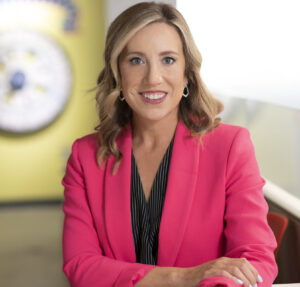Your comms skills can make your job search easier. Here’s how.
Here’s how to build a narrative to land your next position — or a promotion.

Communications executives are master storytellers by trade. But in my years coaching comms professionals, many have confessed that they are more comfortable staying behind the scenes and making their bosses and brands look good.
So, what happens when the tables are turned and you are going through the interview process to land a new job? Do you have a compelling story that will entice a future employer to hire you? When it’s time to “sell” your own brand, how do you show up?
Part of what makes my job so much fun is that as a coach, I get to help people shine on a stage of sorts. It’s not Broadway, of course, but it’s a high-stakes live performance in front of an audience nevertheless! This stage is called the “interview.”
The narrative imperative
Creating a career narrative that spotlights your skills, your achievements, your strengths and the energy of who you are is very important. Yet for many — even the most experienced communicators — “selling” oneself does not come naturally, particularly when we’ve been taught that it’s impolite to brag and boast. But I promise you, crafting stories, examples and anecdotes that contextualize who you are, what you have done — and can do — is exactly what the interview calls for. This is your chance to shine — don’t let fear dim your light!
Keep in mind that in this hiring environment, many recruiters are overworked and burnt out. Despite all of your hard work and preparation, expect that hiring managers may not have read or even skimmed your resume ahead of time. You may be the 8th person they’ve interviewed that day, and if so, chances are they’re not quite as excited to talk with you as you are to talk with them.
Those are some of the things you need to be prepared for, but that you cannot control. Your focus needs to remain on bringing your A-game to every interview to command their attention and pique their interest in bringing you back.
People hire people they like: It’s the truth. And despite what anyone says, so much of the interview process can come down to connection and perceived cultural fit. But remember, that assessment goes both ways. You are interviewing them as much as they are interviewing you.
So, while you are making a good impression, pay attention to the signals you are receiving, as well. Are these people you want to work with every day? What is the vibe in the office? Are you aligned with the company’s mission and their priorities? Either way, every interview is a chance to connect, learn and practice your story, so make the most out of every single one.
So, what is the best way to get your personal and professional narratives “interview-ready”?
Tips to master the interview
Interviews come in all shapes and sizes, so you must be ready for anything. Below is a list of guidelines to get you fully prepared. Consider it a dress rehearsal for your on-stage performance.
Putting in the time upfront matters and trust me, you will thank yourself later. I can’t stress enough how impressive it is when a candidate shows up ready, interested and informed. And how irritating it is when they haven’t!
The fact that they did their homework shows not only their sincere interest in the role, but also shows respect for a recruiter’s time. Candidates have so much data at their fingertips these days — there are no excuses!
1. Character Development. Make a list of your relevant strengths and then practice “selling” them. Study the job description, circle key words and attributes, and map them to your own experience and abilities. What are your distinguishing traits and qualifications that will benefit the company, the team and the manager if they hire you? Are there areas where you over index? Lean into those.
And are there areas where you are less experienced? Practice ways you can frame them positively and bridge naturally to areas where you are stronger. Remember — no candidate rates 100 in every single aspect of a role. Don’t let this throw you. Just be ready!
2. Background Research. Get to know the company you are interested in from every perspective and every angle. Know the latest news, and understand the competitive landscape. Jot down the facts, figures and attributes that speak to you, and keep track of sources so you can reference them in your conversation. Try to speak to a current or former employee and get a personal POV, as well.
3. Know the cast. Google the profiles of the people you will be interviewing with. Check out their LinkedIn profiles and make sure you understand who they are, what they have done and if you have any mutual connections. You might find points of commonality that you can weave into your narrative or mention in your conversation. Most of all, you want to demonstrate that you are interested in them and their experience, not just yourself and the job. Points of connection are a way to make yourself memorable and increase the chances of being invited back.
4. Always use examples from real life. This will add color and credibility to your conversations. The interviewer wants to know how you have succeeded and overcome real life obstacles and scenarios in your life and in your work. The best way to show this is through actual stories from your own experiences that showcase your talents and abilities.
5. Active listening. Listen closely to what your interviewers have to say, so you can be present and curious in the moment. Paying attention will enable you to reference their comments when you are responding to their questions. This mirroring technique is powerful and proven. It reinforces that they have been understood and that you share a point of commonality. Prepare a list of thoughtful, relevant, open-ended questions to ask them as well.
Stories that truly describe who you are and what drives you to be the best that you can be will connect you with a hiring manager on a more personal level that will win them over time after time. When your story is powerfully told, it will make you a candidate to sit up and pay attention to. Make the effort to “sell” yourself and tell your story in an authentic way and let your passion shine so that people will remember you and want to hire you to be on their team.
And remember, you don’t have to check every box, you just have to make a connection with the interviewer by showing up prepared, present and with your inner light switched “on.”
In our next installment in May, we’ll cover how to prepare for behavioral interview questions and how to follow up after the interview.
Mary Olson-Menzel is the founder and CEO of MVP Executive Development and co-founder of Spark Insight Coaching.






